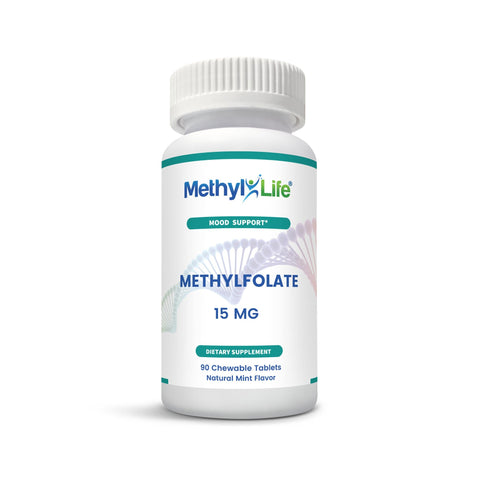
High methylfolate foods

Written By:
Katie Stone - Naturopath
Medical Reviewer:
Kari Asadorian - Bachelor of Science in Nursing
Edited By:
Jamie Hope - Founder of Methyl-LifeUpdated On:
April 29, 2025Table of Contents
What is dietary folate?
Folate is a water-soluble B vitamin (B9) and one of the most essential nutrients for healthy cognition, cardiovascular function, mood, and fertility.
Dietary folate refers to a group of related compounds, including dihydrofolate, methylfolate, monoglutamyl folates, and polyglutamyl folates. Most food folates are in polyglutamyl forms of tetrahydrofolate, which must be broken down by the body before it can be used.
To absorb and use this form of folate, the body uses enzymes to remove the extra glutamate residues, turning the polyglutamyl folate into a simpler form known as monoglutamate folate (a folate molecule with only one glutamate attached). Once absorbed, folate is converted into methylfolate (L-MTHF), which is the predominant form found in circulation and used by cells1. This is why methylfolate is often referred to as the body's main active form of folate, even though the folates in food start in more complex forms.
Dietary folates are in a reduced state, which means they are less stable and can degrade easily with heat, light, and storage. Canning, freezing, or home-cooking can also deplete food of folate. Steaming retains more folate compared to other methods like boiling or frying.
Although the most efficient and convenient way to increase your methylfolate levels is with a supplement, eating folate-rich foods still has its benefits. Natural forms of folate support folate levels while providing nutritional cofactors involved in the methylation process.
What foods are high in methylfolate?
Folate content in these foods is made up of multiple forms, including dihydrofolate, tetrahydrofolate, and methylfolate. Foods like spinach, legumes, and liver are high in folate, but the majority of folate in food exists as polyglutamyl folates (mostly tetrahydrofolate derivatives). These must be broken down into monoglutamyl forms before absorption.
Dietary folate is then converted into methylfolate (L-5-MTHF) in the body, because this is the form used in circulation and for key biochemical processes (like methylation).
Methylfolate (L-5-MTHF) is present in food, particularly in leafy greens, legumes, and liver.
A study analyzing 67 varieties of spinach found that the total folate content ranged from 54.1 to 173.2 mcg/100 g. The most abundant form of folate was methylfolate, accounting for approximately 52% of the total folate content.2
Eggs contain good amounts of folate, but the folate is mainly in the form of polyglutamyl tetrahydrofolate, which must be converted to the active methylfolate form in the body. Around 95% of egg folate is found in the yolk.3
Lactic acid fermentation increases the bioavailability of folates, including methylfolate. A Swedish study found that among 10 different lactic acid bacteria (LAB) cultures, one mixture was able to almost double the folate concentration of grated and blanched root vegetables, mainly beetroots and turnips. After the fermentation process, the vegetables contained high amounts of methylfolate.
Research also suggests that the fermentation process replaces the B-vitamin content that is lost in cooking or heating. A Polish study found that folate content more than doubled during fermentation due to the microbial activity that occurs when sourdough ferments. The traditional Indian dish idli, for example, is a steam-fermented dough made of rice and black chickpeas. During the fermentation process, the folate content of idli may increase by almost 60%.4
Methylfolate Supplements vs. Food Sources
Although supplements should not replace food, there are many reasons that a supplement can better provide the nutrients that a balanced diet cannot.
Many fruits and vegetables today are grown and processed in a way that depletes their nutritional content. One study found that the nutritional content for 43 different vegetables and fruits had declined significantly in the past half-century, which was believed to be due to agricultural practices designed to improve size, growth rate, and pest resistance. In addition, water-soluble vitamins are especially vulnerable to processing and cooking.
As a result, many plant foods will not actually be an adequate or reliable source of folate, especially for people who have heightened needs for folate.
In addition, these foods must first be processed by the digestive system before nutrients can be obtained. If digestion is hindered or weak, the amount of folate absorbed in the gut will be reduced even further. Gastrointestinal illness, poor gut microbiome, and pH imbalance in the gut can hinder folate absorption, along with certain drugs.
Why is Methylfolate Supplementation Important for People with MTHFR?
The MTHFR genetic mutation can impair the folate conversion process, which means dietary folate is not properly activated.
Normally, dietary folate is converted to methylfolate in the intestinal mucosa. The folate cycle begins with the conversion of dietary folate (B9) into dihydrofolate (DHF), which is then reduced to tetrahydrofolate (THF) by the enzyme dihydrofolate reductase (DHFR). THF is next converted to 5,10-methyleneTHF by serine hydroxymethyltransferase (SHMT). This process requires vitamin B6 as a cofactor. In the final step, 5,10-methylene THF is reduced to 5-MTHF by the MTHFR enzyme.
Methylfolate supplementation guarantees the body will be obtaining a specific amount of L-methylfolate every day, which foods cannot. There is no way to measure the exact folate content in a particular food item, which makes it almost impossible to know if the body’s daily requirements are being met. Those with MTHFR have increased demand for folate due to their inability to process it properly. Studies show that an L-methylfolate supplement is the most effective option.
By bypassing the conversion step, supplementation with L-methylfolate can improve folate levels in the body.
Foods high in methylfolate (and other forms of folate)
-
 Romaine lettuce
Romaine lettuce
-
 Sprouted legumes (mung beans, chickpeas)
Sprouted legumes (mung beans, chickpeas)
-
 Broccoli
Broccoli
-
 Asparagus
Asparagus
-
 Leafy greens (spinach, kale)
Leafy greens (spinach, kale)
-
 Cabbage
Cabbage
-
 Fermented foods (sauerkraut, miso, yogurt)
Fermented foods (sauerkraut, miso, yogurt)
-
 Berries (blueberries, strawberries)
Berries (blueberries, strawberries)
-
 Citrus fruits (oranges, grapefruit, and especially lemons)
Citrus fruits (oranges, grapefruit, and especially lemons)
-
 Beef liver
Beef liver
-
 Spinach
Spinach
-
 Black-eyed peas
Black-eyed peas
-
 Brussels sprouts
Brussels sprouts
-
 Avocado, raw
Avocado, raw
-
 Mustard greens
Mustard greens
-
 Green peas
Green peas
-
 Kidney beans
Kidney beans
-
 Wheat germ
Wheat germ
-
 Turnip greens
Turnip greens
-
 Peanuts
Peanuts
-
 Sunflower seeds
Sunflower seeds
-
 Fresh fruits, fruit juices
Fresh fruits, fruit juices
-
 Whole grains
Whole grains
-
 Seafood
Seafood
-
 Eggs
Eggs
Product Recommendations
L Methylfolate 15 mg - A Mood-Boosting Supplement
$76.00
- Professional Strength - Ask Your Doctor
- High-Dose L Methylfolate 15 Mg for Natural Mood Support2
- 3rd-Party Tested for Purity, Potency & Safety
- 90 Vegan, Non-GMO, Chewable Mint Tablets
Frequently Asked Questions about Methylfolate-rich foods
Foods such as spinach (and other leafy greens), liver, eggs, citrus fruits, legumes, and fermented foods are rich in various forms of folate. Adding these to your daily diet can help to support your folate levels naturally. However, if you have a MTHFR genetic mutation, you may need to consider supplementing with methylfolate as this is a more precise, effective, and convenient source of active folate.
Eggs contain significant amounts of folate, but the folate is mainly in the form of polyglutamyl tetrahydrofolate, which requires enzymatic conversion before it can become the active methylfolate form. Around 95% of egg folate is found in the yolk.5
Foods that contain 5-MTHF (methylfolate) include beef liver, spinach and other green leafy vegetables, black-eyed peas, asparagus, brussels sprouts, lettuce, avocado, broccoli, green peas, kidney beans, wheat germ, peanuts, sunflower seeds, citrus fruits, whole grains, seafood, and eggs. However, it should be noted that most foods contain folate in the form of polyglutamyl tetrahydrofolate, which requires enzymatic conversion before it can become the active methylfolate form (the form your body needs).
Yes, one-half of a Hass avocado contains around 60 mg folate.6
References
-
Klaus Pietrzik, Lynn Bailey, Barry Shane; "Folic acid and L-5-methyltetrahydrofolate: comparison of clinical pharmacokinetics and pharmacodynamics"; Clinical pharmacokinetics.; 2010 Aug
https://pubmed.ncbi.nlm.nih.gov/20608755/
-
M J I Shohag, Yan-yan Wei, Ning Yu, Jie Zhang, Kai Wang, Johan Patring, Zhen-li He, Xiao-e Yang; "Natural variation of folate content and composition in spinach (Spinacia oleracea) germplasm"; Journal of agricultural and food chemistry.; 2011 Dec
https://pubmed.ncbi.nlm.nih.gov/22004472/
-
Sattar Bagheri, Hossein Janmohammadi, Ramin Maleki, Alireza Ostadrahimi, Ruhollah Kianfar; "Laying hen performance, egg quality improved and yolk 5-methyltetrahydrofolate content increased by dietary supplementation of folic acid"; Animal nutrition.; 2018 Aug
https://pmc.ncbi.nlm.nih.gov/articles/PMC6544570
-
M Jägerstad, J Jastrebova, U Svensson; "Folates in fermented vegetables—a pilot study"; LWT - Food Science and Technology Vol. 37, Iss. 6, pg. 603-611; 2004 Sep
https://www.sciencedirect.com/science/article/abs/pii/S0023643804000350
-
Sattar Bagheri, Hossein Janmohammadi, Ramin Maleki, Alireza Ostadrahimi, Ruhollah Kianfar; "Laying hen performance, egg quality improved and yolk 5-methyltetrahydrofolate content increased by dietary supplementation of folic acid"; Animal nutrition.; 2018 Aug
https://pmc.ncbi.nlm.nih.gov/articles/PMC6544570/
-
Mark L Dreher, Adrienne J Davenport; "Hass Avocado Composition and Potential Health Effects"; Critical reviews in food science and nutrition; 2013 May
https://pmc.ncbi.nlm.nih.gov/articles/PMC3664913

About the Author
Katie is a qualified Naturopath (BNatMed) and freelance writer from New Zealand. She specializes in all things health and wellness, particularly dietary supplements and nutrition. Katie is also a dedicated runner and has completed more half-marathons than she can count!
Related Articles

MTHFR and Overmethylation
Written By: Katie Stone - Naturopath

Signs and symptoms of MTHFR
Written By: Katie Stone - Naturopath

MTHFR Gene Mutation Treatment
Written By: Katie Stone - Naturopath

Like what you read?
Please subscribe to get more content like this sent to your inbox.
Share This Article
Browse Categories
Product Recommendations
L Methylfolate 15 mg - A Mood-Boosting Supplement
$76.00



